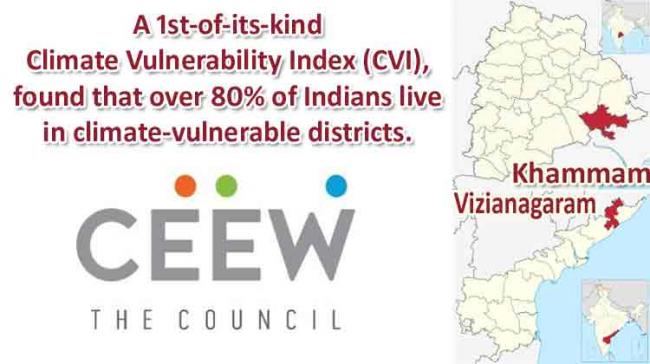Khammam, Vizianagaram Among Most Climate-vulnerable Districts: CEEW Study

NEW DELHI: Andhra Pradesh, Assam, Bihar, Karnataka, and Maharashtra are most vulnerable to adverse climate events such as floods, droughts, and cyclones in India, according to a study released by the Council on Energy, Environment, and Water (CEEW) on Tuesday.
The Climate Vulnerability Index released shows that over 80 percent of Indians live in districts vulnerable to climate risks. The study highlighted that 463 districts in India are vulnerable to extreme floods, droughts, and cyclones.
Dhemaji and Nagaon in Assam, Khammam in Telangana, Gajapati in Odisha, Vizianagaram in Andhra Pradesh, Sangli in Maharashtra, and Chennai in Tamil Nadu are among the most climate-vulnerable districts, it said.
More than 45 percent of these districts have undergone unsustainable landscape and infrastructure changes. Further, 183 hotspot districts are highly vulnerable to more than one extreme climate event, it stated. Climate Vulnerability Index also revealed that more than 60 percent of Indian districts have medium to low adaptive capacity.
India must collaborate with other countries to create a Global Resilience Reserve Fund, which could act as insurance against climate shocks. This would ease the fiscal pressure on the most climate-vulnerable countries, especially from the global south, Arunabha Ghosh, the CEO of CEEW said.
Finally, developing a Climate Risk Atlas for India would help policymakers to better identify and assess risks arising from extreme climate events, he added.
Abinash Mohanty, the programme lead at CEEW and lead author of the study, said the frequency and intensity of extreme climate events in India have increased by almost 200 percent since 2005.
"Our policymakers, industry leaders, and citizens must use the district-level analysis to make effective risk-informed decisions. Climate-proofing of physical and ecosystem infrastructures should also now become a national imperative.
India must create a new Climate Risk Commission to coordinate the environmental de-risking mission," he said. The Study also recommended that restoration of climate-sensitive landscapes will act as natural shock absorbers against extreme climate events.
Our 1st-of-its-kind Climate Vulnerability Index (CVI), found that over 80% of Indians live in #climate-vulnerable districts.
What does this mean for the most vulnerable populations? How are they responding to the #climatecrisis? #DeriskIndia
📺 Watch👇 pic.twitter.com/ZP9WZAPV3E— CEEW (@CEEWIndia) October 26, 2021
Also Read: All Electric MINI Cooper SE on Indian Roads From This Date, Check Features





